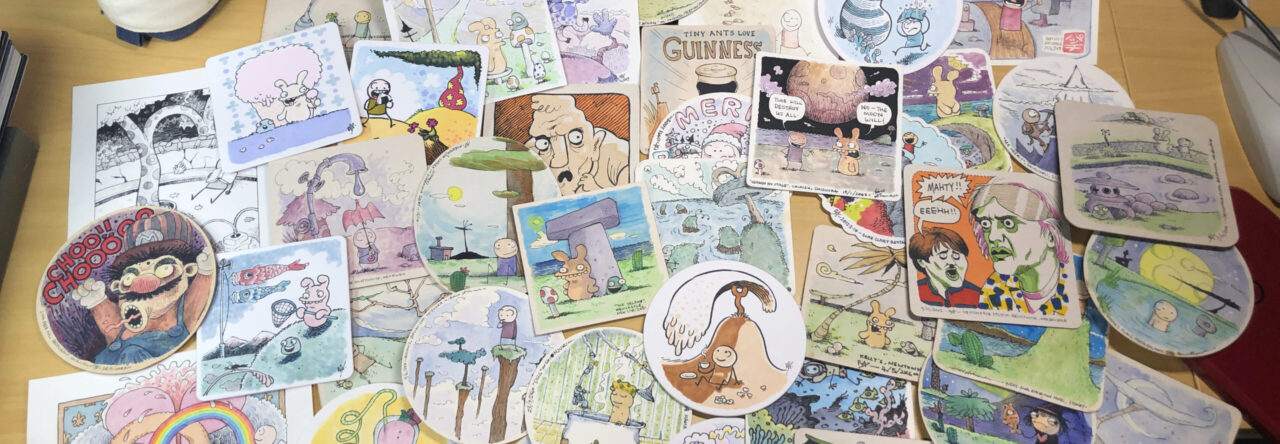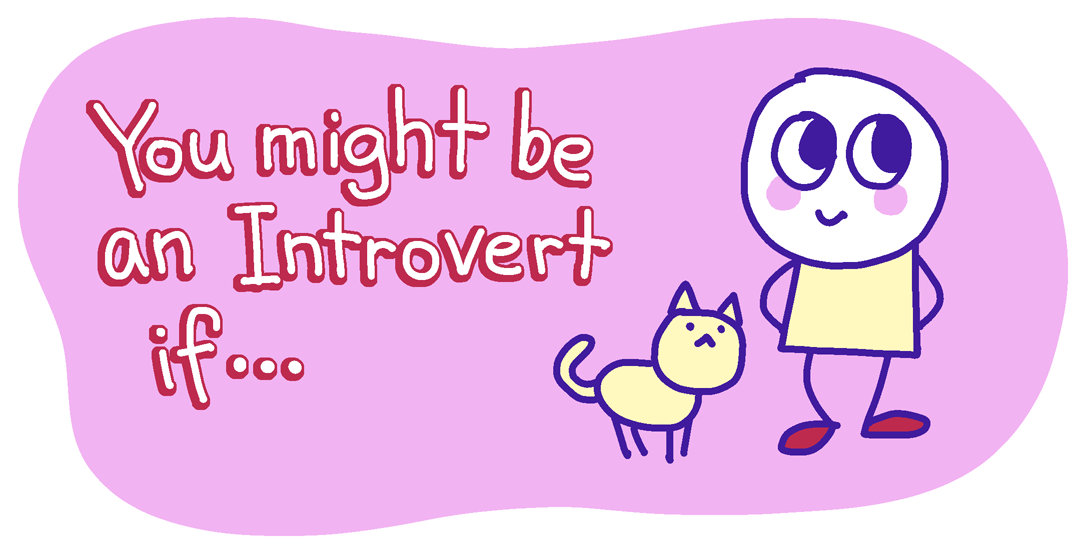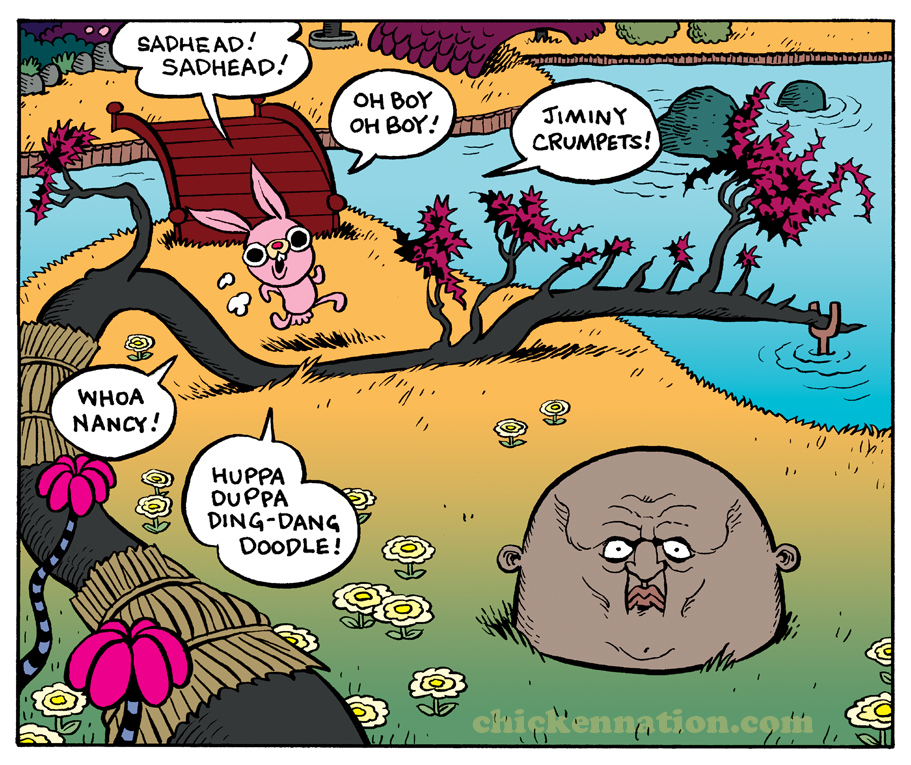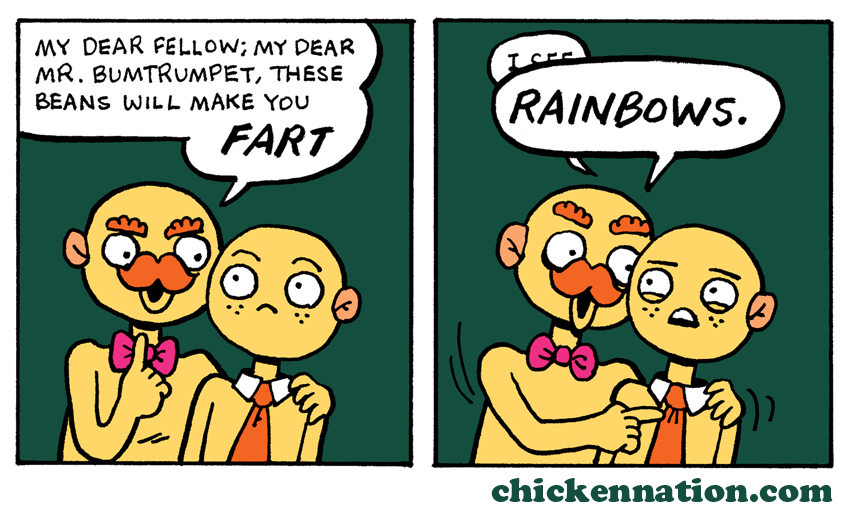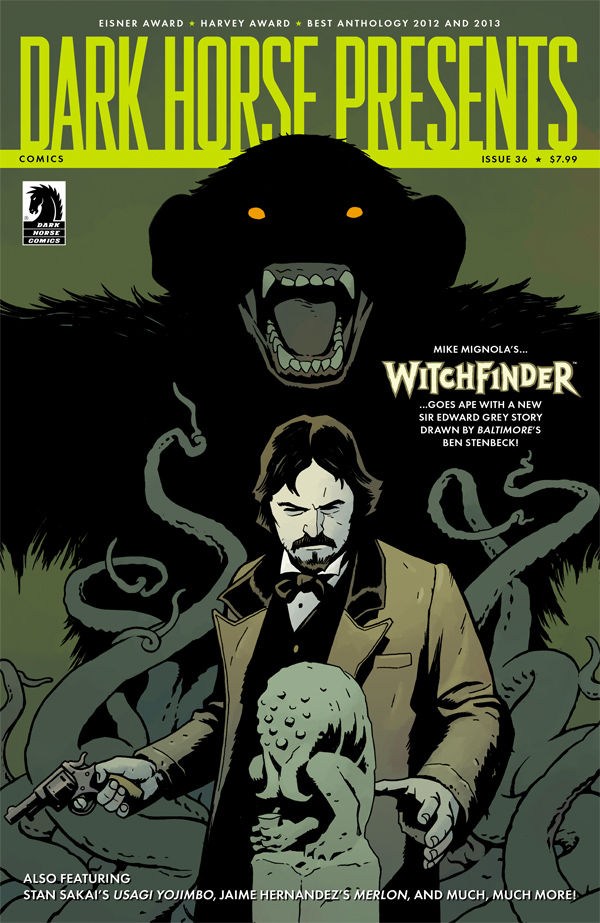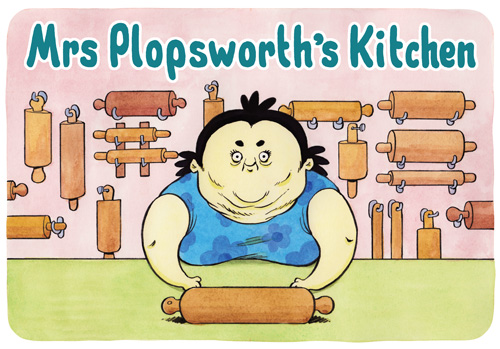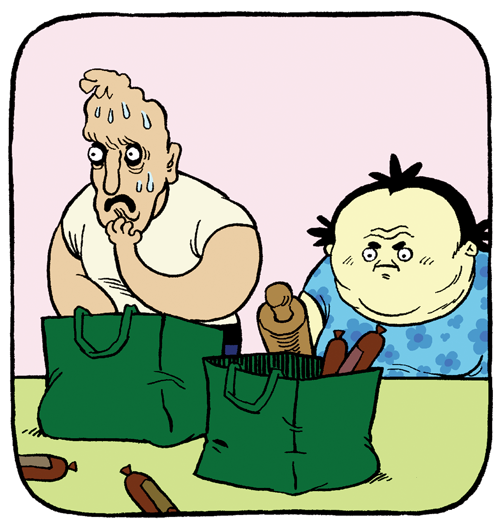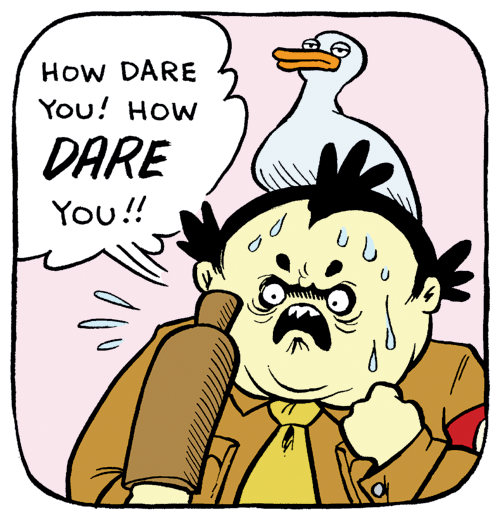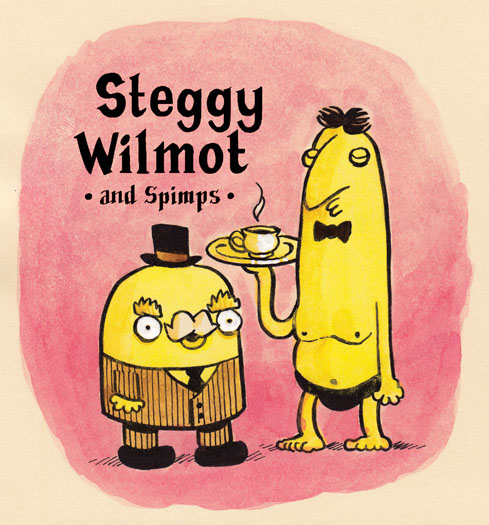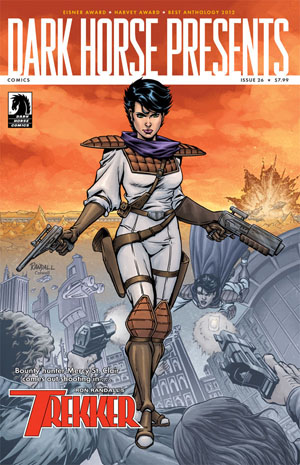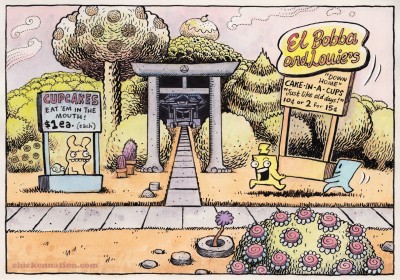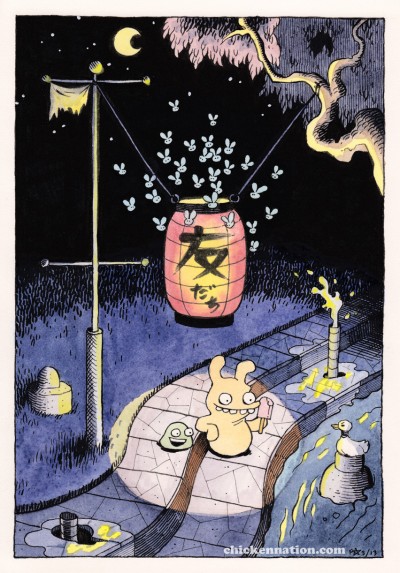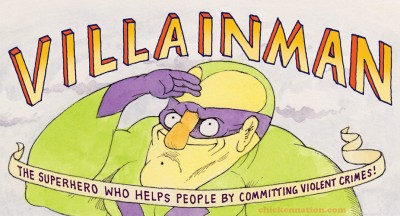The Tale of Genji
~ Chapter XX ~
The Frightened Meow
Translated by Patrick Alexander
with apologies to Murasaki Shikibu and Royall Tyler

It was a pleasant day late in the fourth month – flowers bright and sky blooming, and the garden pond at Genji’s Nijō residence seemed especially wet. From the verandah of the west wing, he observed a swan gliding gracefully upon it, and a maple leaf happened to fall on its head. The sight of it was so barely amusing that he could not help but weep, and reflect upon the cruelty of life and the transitory nature of all things – especially, he thought to himself, things which don’t last long. Gently dabbing away the snot with his sleeves, his form was so striking, and the depth of his nature so palpable, that the swan immediately drowned itself in sympathy. Moved by this gesture, Genji said,
“White rose of the pond, not from me came the order to ‘leaf’ – petals fall;
Death’s thorn is all that remains. What sad song will comfort me?
Every cowboy…”[1]
His young lady, practicing calligraphy indoors, made no reply. Irritated, he turned his head and called out, “Get it? Leaf? Like ‘leave’!” in a loud, clear voice, so rich in tone and character that he himself wept. Entering, he was relieved to find her where he had left her – after all, she’s at that age where they get into everything! – and took a moment to admire her womanly bearing. Tastefully smothered under layers of peach, red, mandarin peel, scum, venerable oak leaf and web colour #752100, she looked like a pavilion had fallen on her. In fact, Genji realised, she was not dressed but tangled up in the curtained bed which had collapsed sideways, the resulting mess and minor head wound only making her more endearing than ever. The trauma of being abducted from her home and stored in a dark room for several months had withered her exquisitely: her sad, sunken eyes now quivering in bony sockets, and having lost so much hair that her eyebrows had, little by little, migrated to the back of her head.
Yes, she had certainly matured. He recalled that lady he knew, and that other lady, and that different lady again, and even – he smiled to himself at the memory – the lady of that specific place. Each one had her own charms, yet none could match the sweetly terrified manner of the treasure now whimpering before him. With an affectionate weep, he inspected the sheets of paper scattered about her writing box. In a hand yet naïve but showing grace, wit and distinction, she had drawn what might have been a kitty-cat next to what was probably a tree, and decorated the remaining space with squiggles. Genji was reminded of the traveller in that old tale.[2]
“Underneath which pine shall I stop to eat pickles? A frightened meow
Draws me to this branch’s shade – I can’t get enough pussy.[3]
Just a small town girl…”[4]
Her blank, open-mouthed incomprehension demonstrated tact and dignity, and this pleased him. He tore up the drawings and threw them in her face. “Terrible!” he cried. “These are no good at all. You really are worthless.” She began to cry for her mummy, and Genji, weeping, laughed until his sides hurt. So pathetic was her howling, tear-stained grimace that he became flushed with delight, and felt with sudden certainty that the time had come to see her. He would see her brains out.
She remained thoroughly entangled, however, and his efforts to extricate her were further confounded by her charming resistance – repeatedly hitting him in the head with a doll. Just as Genji was about to send for a pair of scissors, a message arrived from the Secretary Captain,[5] written on light green paper. It’s little details like that, thought Genji, that really bring this world to life.
“It is too quiet lately,” the message read, “and there is a particular blade of grass in my garden whose stature and richness of colour ought to be shared, but alas, I feel that I am alone here, and my ladies-in-waiting all agree with me. Won’t you join me in an elite homosocial activity of some kind?
The wild dog cries out, longing for the company he grows restless for,
among the plain’s sweet grasses; under the rising mountain.[6]
Piss-up at my place.”
“The very thing!” thought Genji, this new distraction brightening his mood. In gratitude and generosity he gave to the messenger a pair of gathered trousers, and lay upon his shoulders a shift, then a gown, then a sappan robe, and a very fine scarlet cloak. Why the messenger had arrived naked, Genji could not guess, but he thought it unmannerly to ask. He dashed off a reply:
“‘Hurry, I’m waiting!’ – not a hundred men or more could keep me away
from passing the time with you: we dogs may yet learn new tricks.”[7]
Having folded the letter and tied to it a length of heart-to-heart, it struck him to add to the outside, “Baby we can make it!”[8] – and in this gleeful humour, he included so many lush and lavish gifts that a hair-barrow[9] had to be found in which to transport them. He dressed and perfumed himself with such exceptional good taste, and the image of him having done so was so inspiring, that his weeping gentlewomen declared him to be the very moon in the sky – and the moon in the earth too, if there was one, and any other moons there might be. He was all of the moons, and they agreed that if he ever mysteriously vanished, it was because a giant crow-god had taken him to weave into its nest. Surely a lord such as he must have been sent by the Buddha, I suppose to teach us about fashion. You wouldn’t think from looking at statues of him that the Buddha has much interest in that sort of thing, but it is not for me to ponder such mysteries.

Hair-barrow
It was half past the Weasel when Genji arrived at the residence of Tō no Chūjō, whom he found lounging in the south aisle of the main house. In great joy and with moderate weeping they each greeted the other. “Please make yourself at home,” said the Secretary Captain; “pull up a woman.” The smile with which Genji replied hinted that he had already satisfied himself in that respect on his way through the house. “What liberty! He is incorrigible as always,” thought his host, and the two of them laughed and slapped each other’s bottoms in manly friendship. Genji cooled himself down with a fan that he casually produced from his cloak, and Tō no Chūjō, with sudden horror, recognised it as his own wife’s. Written on it, in her distinctive, flowing hand, was this:
“Loyally tended, yet welcoming the warbler, the sapling – alas! –
Is rooted in this garden, but only sometimes by you.”
He sat for a moment in frozen, furious silence. But when he summoned his nerve and looked once more at Genji, gazing out at the plum blossoms and idly breaking wind, his anger sailed away.[10] Perched sideways on a cushion with the top of his head butted against a post and one leg wrapped around his weeping neck, his otherworldy beauty, so unlike anything in the world, made it seem as though he was not of this world. Tō no Chūjō felt acutely his wife’s unworthiness of so noble and beautiful a lover, and made a mental note to strangle his eldest son by her, that her suffering might improve her looks to better please Genji. In fact, Tō no Chūjō wished that he could marry himself, if it meant that Genji might deign to have an affair with him. Genji, for his part, had invited himself into so many of the Secretary Captain’s household only out of a longing to feel closer to their master, before whose charm, poise, and exceptional good looks, his feelings of abashment and arousal vied. Moved by desire, each wept piteously at the other’s uncanny resemblance to the exact type of woman he should most like to possess. Each lord’s tears increased his beauty, which increased the other’s tears, and this might have continued until they were both skeletal with dehydration; bleeding from the eyes and diarrhoetic, had Tō no Chūjō not called, between heaving sobs, for wine and musical instruments.
Genji played the sō no koto with such improbable elegance that, were it not for the faultless looks that betrayed his youth, one might have imagined him an immortal Buddha, alive in the days when, through mastery of music, men could raise mountains from the sea and cause rabbits to grow or shrink up to one sun in length. God or man, his welcome face brightened this wretched earth like a cloudless sky, and it seemed to shine as he sang,[11] in a voice that might have brought dead cockroaches back to life. Whether or not he was born to be an Emperor of the Realm, he must surely be a Prince of the Universe.[12] Tō no Chūjō did a song too, and it was all right.
Word of their intimate get-together spread throughout the City, and the two friends were joined by many more nobles, officials and distinguished personages, and even a few people. The Right Hon. Commander of the Left was there, as was the Left Hon. Commander of the Right, and the Barely Hon. Commander of the Middle. The Middle Commander of the Honorable Bear poured wine for the Acting Stupid Counselor, who passed the cup to his son, the privy paper, whose sweetly blushing face delighted anyone present too young to remember how much better-looking Genji had been at the same age. The Intendant of the Right Gate Watch was there, as was the Right City Commissioner; the Intendant of the Wrong Gate Watch got lost and came in the back way, while the Wrong City Commissioner, despite having sent word of his departure, was nowhere to be seen. The wine flowed freely, as did the tears, and many dances were performed by the younger nobles, including ‘Blue Sea Waves’, ‘One Fish, Two Fish’ and ‘Turkey in the Straw’. Many voices called for a dance from Genji, who, with just the sort of humility that takes one’s breath away, declined – but soon enough he yielded to the hooting and hollering of the assembled dignitaries, and, accompanied by the Secretary Captain both on the wagon and off it, he performed the little-known ‘Have You Ever Seen a Peasant’. His arms flapped and pelvis wiggled with such consummate perfection that those who were not stunned beyond cognition feared he would be lifted into the heavens by the very gods, and when the dance was over, the incontinent emotions of all present left no part of any garment dry, sleeves or otherwise. The young nobles who had danced before him all rubbed fistfuls of dirt into their hair, in shame and disgrace. The gentlewomen who had been peeping through the blinds fell ill with fever, and many never recovered, though it is said that every one passed away with a smile on her face.
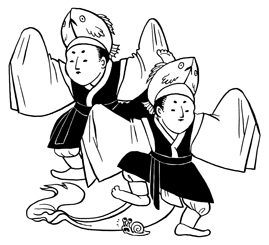
‘One Fish, Two Fish’
With some agitation and excitement, the Secretary Captain now called for poetry in honour of his bloody magnificent blade of grass, while there remained daylight enough to appreciate it. One by one, each guest, brimming with deep emotion, lurched with courtly grace to the centre of the gathering, and recited the finest thirty-odd morae he could slur together. Not all of the offerings were without merit, but at last it was Genji’s turn. He seemed to tower over even the honoured grass, and in the light of sunset, he glowed as if lit from within by smouldering passion, and the remarkable beauty of his face was cast into such intense relief that I must put down my brush for a moment and fan myself. Those present not already weeping with delight must have bitten their lips in sweet anticipation. Under what constellation could this godlike being have entered so undeserving a world? How grateful they were for his extra time.[13] He cleared his throat, spat out the phlegm, and with sureness of tone, and in a deep, fertile voice, he sang,
“Ohr, look at that grass. That is def’nitely some grass, and it’s really good.
Standing there in the dirt, like… that’s really good and that, ey.”
The poem took some time to complete, punctuated as it was by bursts of rapturous applause, and when it was over, the ground was muddy with tears; the air heavy with howls of sorrow. A few nobles of rarified sensitivity were so overwhelmed that their heads exploded; others simply tore their robes and lashed themselves with bamboo shoots, wailing as though possessed by totoro; a small number suddenly remembered family members from whom they could not recall ever hearing ingenuous and extravagant praise for Genji, and went home early to beat them. Suddenly the earth rumbled and shook, then broke apart – a black and terrible crevice tearing the garden in two, and amidst foul smoke and searing flames, a devil appeared, fearful of form and baneful of mug. All prostrated themselves in terror, except for Tō no Chūjō, who prostrated himself out of politeness; a couple of older nobles who had prostrate troubles; and of course Genji, who stood tall and proud, and feared nothing, and was handsome. The creature thrust a barbarous claw at him and said, “My very purpose is to cloud the minds of men, that they might turn from virtue and be devoured – yet know that this day, one thousand souls have been released from torment, in honour of your lovely poem.” It bowed low before Genji, then vanished in embarrassment as it began to weep.
The party continued into the night, with the usual entertainments and diversions that need not be described in detail for you, my fellow Heian period noblewomen. A pair of young bloods were gossiping within earshot of Genji, in what they drunkenly mistook for low voices.
“Do you see the older gentleman yonder, discreetly relieving himself into the lake?” began the one.
“I do,” replied the other.
“That is the Thirty-seventh Prince, His Highness of Inspecting the Shelves.”
“Is that so? I have hardly heard of His Highness, but what I have heard is that having no sons or daughters, in these his winter years he has developed a fondness for cats, and populates his house with them.”
“That is true as far as it goes, but recently I have heard – just whisperings here and there – that this eccentric behaviour is a clever ruse, and in fact he has a daughter, no older than twenty, whose existence he hopes to keep secret,” said the one.
“Cheeky old bugger!” said the other. “But how is it that no-one has heard of her until now?”
“To protect her innocence, she has been locked since birth inside a large wooden box. Her gentlewomen are not permitted to speak to her, nor she to them, so no-one has heard her voice. She communicates by tapping in code upon the wood, though never so rhythmically that it might sound musical – yet I have heard that the tapping shows rare distinction; even a certain yielding sweetness. It is no wonder that His Highness has taken such care, since she is so well-bred that she is her own mother, twice – and is beautiful, too. Her face is very nearly symmetrical; in fact, one of her eyes opens all the way, and the other two are captivating as well. The mirror of your dreams…”[14]
The other was deeply impressed. “What about her sleeves? Are they colourful? Are the colours bright yet tastefully chosen?”
“I have heard nothing of her sleeves,” the one admitted. “I believe the wooden box is completely sealed, save for a small, round hole through which she is fed, about the width of a man’s finger.”
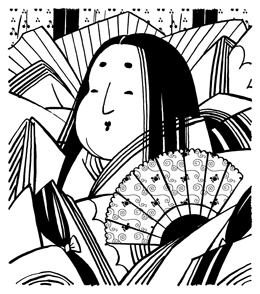
A Heian beauty
At this, Genji rose. That is just the right size! Why shouldn’t I have a princess, after all? It was true that no woman of any rank could supplant the young lady at Nijō in his affections, but it would suit him very well to have a more mature companion, who could properly appreciate it when he said something clever, and who would not still wet the bed sometimes. Yes, he decided, this secret daughter was just what he needed in life – and more to the point, what he happened to feel like right now. Feigning a contagious skin disease, he stood up and excused himself from the gathering, then stole away to the residence of the Thirty-Seventh Prince. Discretion was paramount, so he travelled with a minimal retinue of twelve men, only four of whom were heralds.
Knowing that the Prince was not at home, he strode through the main gate, and was met at the gallery entrance to the east wing by an aged nun, whose unpleasant, rasping voice felt to him like someone was trying to scrub his hair off with a big rock. Who lets these women live so long? It really is tasteless. With great composure, and withholding the full facts of his identity, he explained to her his pretext for visiting.
“A pretext? Well, I am sure His Highness would be very grateful, but he is not present to receive one at the moment.”
“Alas! O, blimey!” cried Genji, feigning surprise. “Then I can think of no reason to impose upon you further. Although…
Lying at your door, having walked five hundred miles, even a stray cat
Could haver in your garden ere walking those miles again.”[15]
The old woman took his meaning, and since she had guessed from the peerless character of his voice and the colour of his prose who he was – though she could scarcely believe it was truly he[16] – she directed him to the outhouse with no objection. The young gentlewomen, drawn to his youth and charm, the like of which they had never known, sat close to the shutters, gleefully listening to the sound of his movements, carried across the still night air. The timbre of his farts was like no other; rich, deep and noble, yet with a certain easy grace that spoke of his fine nature. His toots and whistles flowed like music, strange and beautiful, and their hearts overflowed with a longing they did not understand. Even the nun was moved to weep. “I had thought His Highness’ flatulence truly grand,” she croaked through her tears, “but tonight I feel that I have witnessed the perfumed evacuations of Amida Buddha himself, and at last I am ready to pass like wind from this world.”
Genji was now sneaking through the shadows of the garden, peering in at the house, in search of some clue that would reveal the presence of she for whom he had a thing. Through an open shutter of the west wing, he perceived silhouettes of furniture in the interior. One rectangle in particular seemed somehow possessed of a rare dignity; its angles appealing yet refined, and with sudden exhilaration he knew, with the certainty of adolescence, that it must be she. He stole up to the blinds and whispered, “Do not be afraid! I am rich and sexy. These many minutes I have longed for you, swollen with karma. The miracle of my finding you here, in your very home, is proof that we are irresistibly drawn together by fate, so it is pointless to resist me.
Turn to me, bright eyes, and dispel longing’s shadow from my restless heart –
Yet that longing is eclipsed by a dream of something wild.
Forever’s gonna start…”[17]
He spoke with ardent passion, but she did not reply. How cruel she is! Yet he was delighted after all by her ladylike restraint. From the deep connection he felt with her, he sensed that in fact she was exceptionally talented, and had refrained from speaking because she was too well-mannered to flaunt the quality of her wit. Wanting her more than ever, yet not knowing what to say, a fervent appeal came pouring from his heart:
“Now I have found you, do not shy away from me; I will not be gone
Come tomorrow and a day – take on me; O take me on!”[18]
He waited in torment for any kind of response. It was agony! Had he mentioned that he was important? Should he mention it again? Then all of a sudden, in a voice as sweet as jellied fish heads, she replied:
“Meow.”
Genji was thrilled. How coy she was; how playful and yet how modestly reticent! He would have wept with joy even to know that such a perfect jewel existed somewhere in the world – and to be in her presence…! It was more than he could bear, and desire overwhelmed him.
The moon passed behind a cloud, and Genji did not miss his chance. He threw aside the blind and leapt into the room. “My darling, come to me!” he cried, stumbling about in the darkness, waving his arms to and fro; desperately trying to locate her. Ploughing his shin into an armrest, he fell to the ground, and for the briefest of moments felt something brush across his hand. He grabbed at it with breathless urgency, and suddenly he had her arm. Her slender frame was a wonder, and he marvelled at the exquisite softness of her sleeve. She howled and hissed as he pulled her closer, and Genji was shocked and delighted to receive painful scratches to his face and arms. The fury of her resistance was exhilarating! He chased her and grappled with her in this manner for some time, tripping over screens and banging into cabinets; barely noticing the many bruises and wounds he was accumulating – until at last he ran into a pole with such force that he fell unconscious. He was discovered shortly afterwards by a pair of household guards, who surveyed the scene with bewilderment and concern, and eventually he was discreetly carried home by his own men, dreaming all the way of her perfect face.

